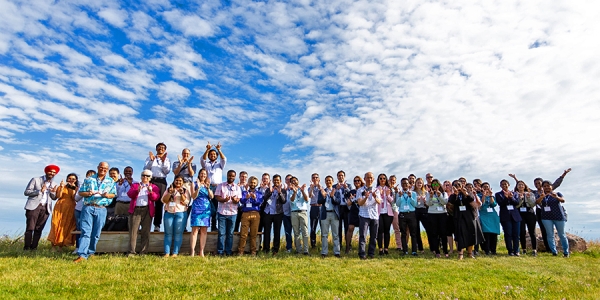 The Engineering to Adapt symposium discussed challenges and solutions to responsible living.
The Engineering to Adapt symposium discussed challenges and solutions to responsible living.
Jul 6th, 2023
The Engineering to Adapt symposium, held June 22 and 23 at the University of Windsor, brought together stakeholders, enthusiasts, and experts from academia, industry, and the public sector to discuss current challenges and sharpen existing solutions that advance responsible living.
The Greek letter eta signifies efficiency, as well as being the symposium’s acronym, said conference chair David Ting, a director of the Turbulence and Energy Laboratory which hosted the event.
“Engineering efficiency entails minimizing entropy generation and environmental interference and is the key to brightening tomorrow,” he said. “Our research strives to catalyze every person to engineer efficiency.”
This symposium promoted collaboration to maximize opportunities for innovation. Dean of engineering Bill Van Heyst delivered welcoming remarks, and former dean Graham Reader gave a presentation on Waste Not, Want Not that focused on rethinking problems with food waste and fast fashion.
— Published on May 9th, 2024
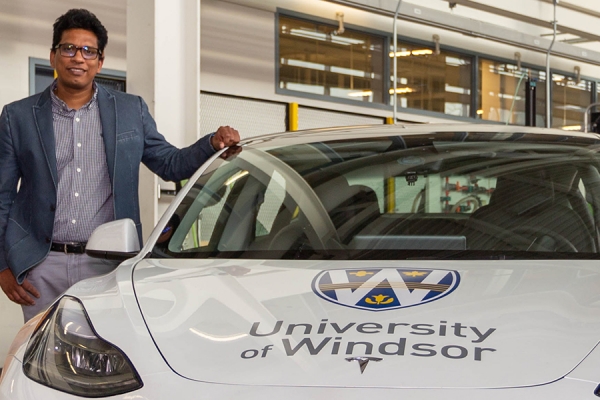 Unlike internal combustion engines, battery power is more efficient on city road than highways, says engineering professor Balakumar Balasingam.
Unlike internal combustion engines, battery power is more efficient on city road than highways, says engineering professor Balakumar Balasingam.
Jul 3rd, 2023
Traditional fuel-powered automobiles, powered by internal combustion engines, give higher mileage on highways than city roads.
It could be expected that a fully charged battery electric vehicle should be able to drive longer on a highway compared to the city. However, the reality is just the opposite, says a UWindsor engineering professor.
— Published on May 9th, 2024
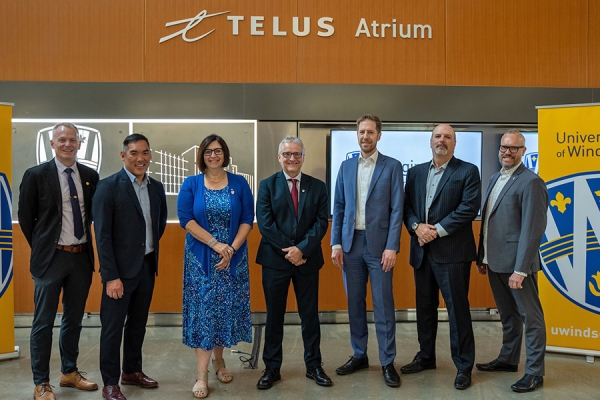 Officials from the University and the telecommunications company Telus celebrate the designation of the lobby of the Centre for Engineering Innovation as the Telus Atrium.
Officials from the University and the telecommunications company Telus celebrate the designation of the lobby of the Centre for Engineering Innovation as the Telus Atrium.
Jun 26th, 2023
Visitors to the University of Windsor’s Ed Lumley Centre for Engineering Innovation will now pass through the Telus Atrium, a space marking the two organizations’ shared priority of connectivity.
Leadership from the University and the telecommunications company came together last week to unveil the new sign in the lobby of the building, home to the Faculty of Engineering.
UWindsor president Robert Gordon said the partnership helps build on the University’s strategic priority of advancing bold, impactful research, scholarship, and creative activity.
“Our researchers bring global perspectives, emerging knowledge, and leadership to the table as we address regional challenges together with our industry partners like Telus,” Dr. Gordon said.
— Published on May 9th, 2024
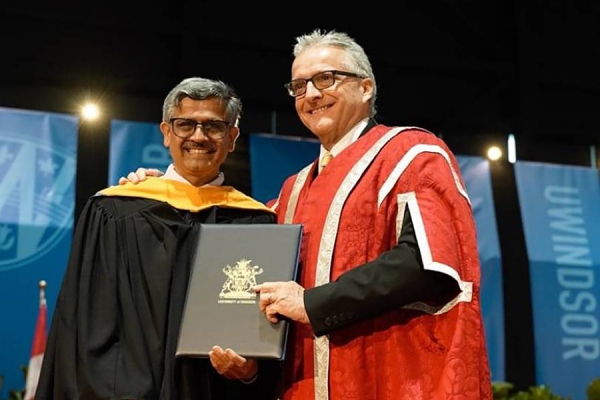 Engineering professor Ram Balachandar accepts congratulations on attaining the rank of Distinguished University Professor from UWindsor president Robert Gordon during May 31 Convocation ceremonies.
Engineering professor Ram Balachandar accepts congratulations on attaining the rank of Distinguished University Professor from UWindsor president Robert Gordon during May 31 Convocation ceremonies.
Jun 6th, 2023
The University of Windsor conferred the title of Distinguished University Professor on civil and environmental engineering professor Ram Balachandar during spring Convocation celebrations Wednesday, May 31.
The rank is awarded to senior scholars at the height of their careers who have distinguished achievements in teaching, and whose scholarly activities reflect a body of work recognized at a national or international level.
— Published on May 9th, 2024
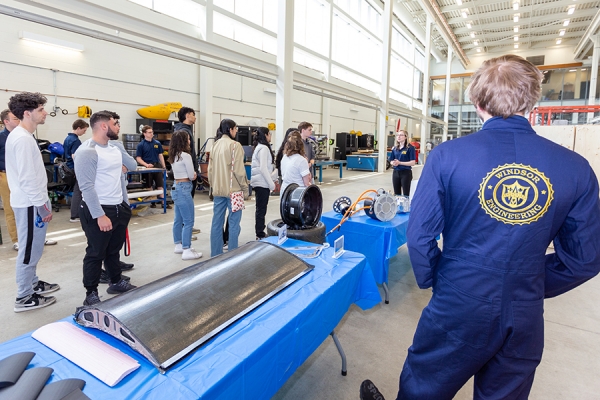 Tours of the Centre for Engineering Innovation showing student projects in progress were a highlight of the May 6 Engineering Academic Open House.
Tours of the Centre for Engineering Innovation showing student projects in progress were a highlight of the May 6 Engineering Academic Open House.
May 15th, 2023
Faculty, staff, and current students welcomed prospective students and their guests at the Engineering Academic Open House on Saturday, May 6.
Visitors were provided with a brief overview of academic programs, supports, awards, and scholarships available in the Faculty of Engineering. Afterwards, prospective students mingled with current students and performed hands-on activities while parents and champions participated in a panel discussion that focused on student support services.
— Published on May 9th, 2024
 Associate dean of engineering for professional programs Peter Frise, right, welcomes new students to the Master of Engineering program.
Associate dean of engineering for professional programs Peter Frise, right, welcomes new students to the Master of Engineering program.
May 11th, 2023
Faculty, staff, and students welcomed more than 500 Master of Engineering (MEng) students to the University of Windsor at an orientation session Tuesday, May 2.
The day included a cricket match on the big screen, a light lunch, and presentations on academic policies, course requirements, faculty advising, immigration guidance, student rights, peer support, mentorship, and clubs and social events.
“It is great to see so many bright students coming to Windsor from around the world to earn their Master of Engineering degree,” said Peter Frise, associate dean of engineering for professional programs.
“These students worked hard to get here, with the support of their families, and we are proud that they chose the University of Windsor’s MEng program as an entree into an engineering career in Canada.”
— Published on May 9th, 2024
 Engineering students Pegah Mansourian and Mina Zamanirafe won an award at the International Conference on Wireless and Satellite Systems for their paper on detecting attacks on automotive computer systems.
Engineering students Pegah Mansourian and Mina Zamanirafe won an award at the International Conference on Wireless and Satellite Systems for their paper on detecting attacks on automotive computer systems.
Apr 27th, 2023
As the automotive industry shifts toward electric and autonomous vehicles, security is more important than ever. Research into the field by two UWindsor engineering students was honoured as best paper at the International Conference on Wireless and Satellite Systems, held in Singapore last month.
Pegah Mansourian and Mina Zamanirafe, doctoral students of computer and electrical engineering, developed machine learning software that can detect an attack on systems before they have an effect.
“We want to ensure they are safe as possible for the consumer,” says Mansourian. “If an attack was to occur while a person is driving it could be very dangerous, as the driver wouldn’t have control.”
Their paper, “Anomaly Detection for Connected Autonomous Vehicles using LSTM and Gaussian Naïve Bayes,” co-authored with engineering professor Ning Zhang, computer science professor Arunita Jaekel, and Marc Kneppers, chief security architect for Telus, telecommunications company, focuses on the development of software for the in-vehicle experience.
— Published on May 9th, 2024
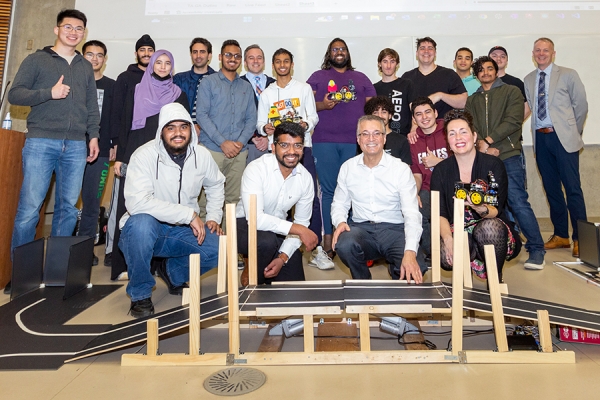 First-year engineering students pitted their skills in competition at the conclusion of the Cornerstone Design course.
First-year engineering students pitted their skills in competition at the conclusion of the Cornerstone Design course.
Apr 18th, 2023
A classroom in the Centre for Engineering Innovation was filled April 4 with engineering students and faculty as teams competed for bragging rights and cash to send an autonomous vehicle through an obstacle course.
The 60 teams were the initial class of “Cornerstone Design,” a mandatory first-year engineering course which tasks students with designing, programming, and building an autonomous emergency vehicle using an Arduino Elegoo Robot car kit.
The autonomous vehicles were to carry a patient on the back while undergoing an obstacle course. Students were not limited to the design of the patient carrier; the design was open-ended and had to represent how a patient would be transported.
— Published on May 9th, 2024
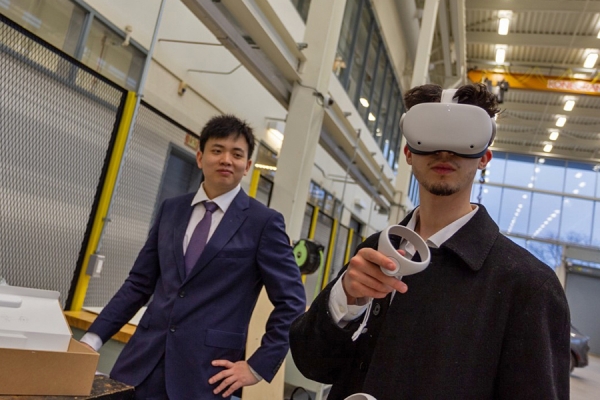 A virtual reality lab was one of the projects demonstrated by fourth-year industrial engineering students on March 31.
A virtual reality lab was one of the projects demonstrated by fourth-year industrial engineering students on March 31.
Apr 14th, 2023
The capstone showcase for industrial engineering, March 31 in the Centre for Engineering Innovation, featured excellent examples of student achievement, said professor Jill Urbanic.
“The students’ hard work and quality of results were evident during the demo day. They had some great solutions to show off,” she said.
The Faculty of Engineering’s capstone design program generates student-driven solutions to real-world problems. Projects challenge fourth-year engineering students to apply the formal knowledge they’ve gained during their undergraduate studies.
— Published on May 9th, 2024
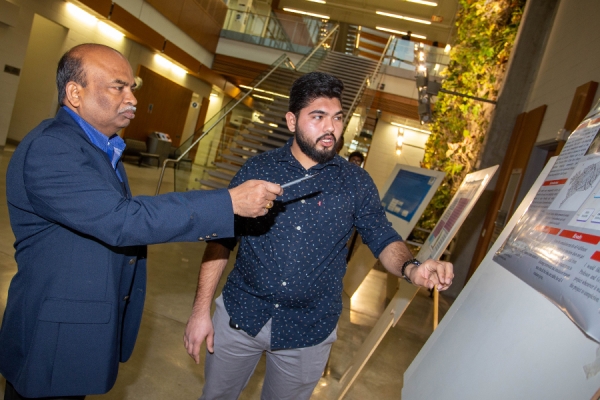 Civil engineering professor Tirupati Bolisetti looks at a project by student Digvijaysinh Borasiya on World Water Day.
Civil engineering professor Tirupati Bolisetti looks at a project by student Digvijaysinh Borasiya on World Water Day.
Apr 12th, 2023
The next time you look at a river, think of engineering students Andrew Bastable, Larissa Dushime, Celia Dycha, and Stefano Kerr.
The team studied the effects of climate change on the Petawawa River with the goal of preventing flooding by adding a hydraulic structure to monitor and control the river flow.
“The river is challenging as the widths change throughout,” Dushime said.
Her team’s research project was one of 50 posters presented by undergraduate and graduate students of civil and environmental engineering at the Ed Lumley Centre for Engineering Innovation on Wednesday, March 22, to mark World Water Day.
Dean of engineering Bill Van Heyst and Chris Houser, interim vice-president of research and innovation, were guest speakers at the event.
“Climate change is here to stay, and we must adapt,” said Dr. Van Heyst. “Our challenge now is how to mitigate as much damage as possible for future generations.”
— Published on May 9th, 2024
 The Engineering to Adapt symposium discussed challenges and solutions to responsible living.
The Engineering to Adapt symposium discussed challenges and solutions to responsible living.









